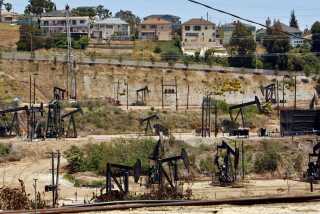Oil and Energy Alternatives
- Share via
Re “Running Out of Oil -- and Time” (Opinion, March 7), about the prospect that the U.S. and, indeed, the world will eventually confront the reality that world oil supply will not meet the demand for petroleum: Paul Roberts writes almost entirely about conventional oil resources, the kind where drilling discovers new oil reserves that can be integrated into our present system of development and consumption, and only fleetingly refers to other, more expensive hydrocarbon sources.
Recognizing the peril of overly restricting production, the Saudis pointed out very clearly 30 years ago that high prices would bring about production of oil from exotic sources; e.g., coal, oil shale, tar sands and heavy oil deposits, which have not been commercial. The Saudi response was, “Our only other resource is sand. It is therefore necessary to keep oil prices at reasonable consumer levels.” Conventional oil reserves are only those that can be produced at a profit. As soon as the price gets high enough, many other sources of supply will become commercial. The heavy oil deposits of Venezuela are very large, and the tar sands of Athebaska in Canada are awaiting development, as are the oil shale formations of Colorado, Utah and Wyoming. As the price of crude oil rises, we may expect the arrival in the marketplace of oil from presently exotic commercial sources that will stabilize the market and avoid the catastrophe Roberts predicts.
Arthur O. Spaulding
Ojai
*
Roberts’ reference to “the news last month that the vast Saudi oil fields are in decline” fails to tell the rest of the story. Saudi officials’ analysis suggests at least a 50-year production profile at production rates above today’s. Also, the Saudi reserve profile is conservative, not counting the additional reserves likely to appear.
Roberts is correct, of course, in observing that oil resources, as all physical resources, are finite, but most serious observers believe that “economic depletion” (replacement by an alternative energy form) will occur before physical depletion sets in. That point will be many more years after 2015.
I encourage anyone wishing to see the rest of the story to access the Center for Strategic and International Studies website.
Tony Finizza
Dana Point
*
Roberts is correct that, if oil becomes scarcer, prices will increase and supplies will expand as it becomes economically attractive to extract less-accessible reserves. He fails to note that demand will also decrease. High prices are a compelling signal to conserve. When prices increase, private and public funds will flow readily into the development of alternative energy sources because success will make it possible to cut costs.
Prices will not crush us. They will guide us, just as they should.
James E. Moore II
Professor of Industrial
and Systems Engineering
USC, Los Angeles
*
The writing was on the wall back in 1973 when we had our first oil crisis. What action came out of the “Land of the Bought and Paid For” (Washington, D.C.)? What if they had passed a few laws requiring that all new construction have solar panels on roofs? What if money had been put into fuel cell research for electric power on a large scale instead of continuing down the road to pollution, global warming and higher costs?
Why don’t we have a real energy program in this country to get us off the Middle East merry-go-round? It’s really very simple. You can’t sell sunshine.
Robert Deubler
Whittier
*
The most promising solution to the shortage of oil is the thermal depolymerization process, or TDP. It is designed to transform almost any kind of waste product -- turkey offal, tires, plastic, garbage, computers, medical waste, even anthrax spores -- into high-quality oil, clean-burning gas and purified minerals.
A processing plant is already up and running at Philadelphia’s Naval Business Center, successfully turning turkey offal into oil. A federal grant has been approved to set up demonstration plants in Alabama and Nevada for processing chicken offal, manure, grease and crop residuals. Other plants are planned for Colorado and Italy.
The first of these polymerization centers should be operating in 2005. If this process works as well as it is supposed to, it could not only provide the world with sufficient clean fuel but rid it of unwanted waste as well.
Barbara Larsen
Los Angeles
*
The idea that the world is running out of oil sooner or later is not new. Roberts’ commentary reminds us that it is not a matter of whether, but rather of when. Once the supplies of oil no longer support the Earth’s consumption, the economic fallout will be rapid and catastrophic.
Now is the time for us to create the tax and governmental policies to ease the transition and provide real alternatives. The future demands it.
Grant Schenck
Easton, Conn.
More to Read
Sign up for Essential California
The most important California stories and recommendations in your inbox every morning.
You may occasionally receive promotional content from the Los Angeles Times.













